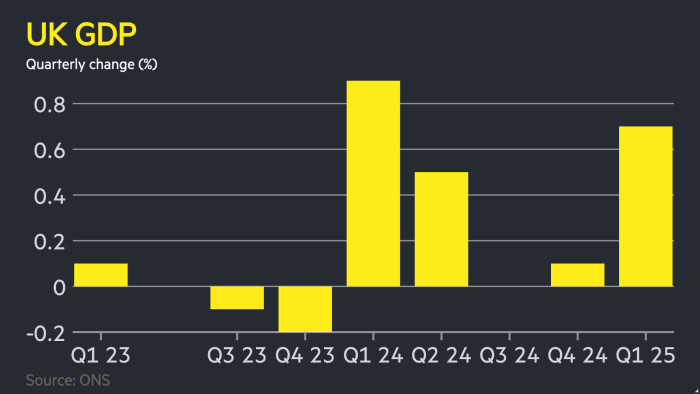Unlock the Editor’s Digest for free
Roula Khalaf, Editor of the FT, selects her favourite stories in this weekly newsletter.
The UK economy grew 0.7 per cent in the first quarter, surpassing expectations and delivering a boost to Labour ahead of the impact of Donald Trump’s tariffs.
Thursday’s GDP figure for the first three months of the year was above both the 0.6 per cent forecast by economists in a Reuters poll and the 0.1 per cent expansion in the fourth quarter.
In March, the economy expanded 0.2 per cent compared with analysts’ forecast of no growth. The first quarter’s performance was powered by an increase in investment and a positive contribution from net trade, according to the Office for National Statistics.
The Labour government says growth is its top priority, although its critics accuse it of slowing down the economy with measures such as an increase in employers’ national insurance contributions that took effect last month.
Welcoming the first quarter’s rebound, chancellor of the exchequer Rachel Reeves said: “Up against a backdrop of global uncertainty we are making the right choices now in the national interest.”
Thursday’s figures are based on data compiled before Trump’s April 2 announcement of tariffs on countries across the world, including 10 per cent duties on imports from the UK.
Many economists say the tariffs will hit global growth, even though Trump has scaled back many of them.
While Washington and London agreed a limited trade deal last week — lowering tariffs on UK car and steel exports to the US — the flat 10 per cent charge remains in place.
The Bank of England has already warned that first-quarter growth is likely to be “significantly above” the UK’s underlying economic momentum, highlighting weak productivity and high borrowing costs. The central bank expects growth to slow to 0.1 per cent in the second quarter.
Simon Pittaway, senior economist at the Resolution Foundation, cautioned that “this growth rebound is unlikely to last, with data for April looking far weaker, and huge tariff-shaped clouds hanging over the global economy”.
The UK GDP for the first quarter of this year compares with a 0.4 per cent expansion in the Eurozone during the period and a 0.1 per cent contraction in the US — figures that were distorted by a surge of imports
Following the data release, the pound edged up 0.2 per cent against the dollar to $1.329.




